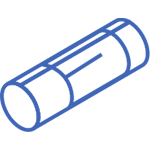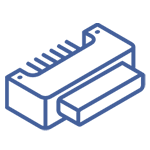

Visual Communications Company - VCC CNX_440_E02_4_1_24
Manufacturer No:
CNX_440_E02_4_1_24
Tiny WHSLManufacturer:
Utmel No:
2671-CNX_440_E02_4_1_24
Package:
-
Datasheet:
Description:
5MM THREADED CABLE ASSY
Quantity:
Unit Price: $4.533533
Ext Price: $4.53
Delivery:





Payment:











In Stock : 26
Minimum: 1 Multiples: 1
Qty
Unit Price
Ext Price
1
$4.533533
$4.53
10
$4.276918
$42.77
100
$4.034828
$403.48
500
$3.806442
$1,903.22
1000
$3.590983
$3,590.98
Want a lower wholesale price? Please send RFQ, we will respond immediately.
RFQ Now
Add to RFQ list
You may place an order without registering to Utmel.
We strongly suggest you sign in before purchasing as you can track your order in real time.
For your convenience, we accept multiple payment methods in USD, including PayPal, Credit Card, and wire transfer.
RFQ (Request for Quotations)It is recommended to request for quotations to get the latest prices and inventories about the part.
Our sales will reply to your request by email within 24 hours.
1. You'll receive an order information email in your inbox. (Please remember to check the spam folder if you didn't hear from us).
2. Since inventories and prices may fluctuate to some extent, the sales manager is going to reconfirm the order and let you know if there are any updates.
- TypeParameter
- Factory Lead Time6 Weeks
- Mount
In electronic components, the term "Mount" typically refers to the method or process of physically attaching or fixing a component onto a circuit board or other electronic device. This can involve soldering, adhesive bonding, or other techniques to secure the component in place. The mounting process is crucial for ensuring proper electrical connections and mechanical stability within the electronic system. Different components may have specific mounting requirements based on their size, shape, and function, and manufacturers provide guidelines for proper mounting procedures to ensure optimal performance and reliability of the electronic device.
Hardware - Material
In electronic components, the parameter "Material" refers to the substance or material used in the construction of the component. The choice of material is crucial as it directly impacts the component's performance, durability, and other characteristics. Different materials have varying properties such as conductivity, resistance to heat, corrosion resistance, and mechanical strength, which determine how the component functions in a circuit. Common materials used in electronic components include metals like copper and aluminum, semiconductors like silicon, insulators like ceramics and plastics, and various alloys. Selecting the appropriate material is essential for designing reliable and efficient electronic components.
Thermoplastic - Packaging
Semiconductor package is a carrier / shell used to contain and cover one or more semiconductor components or integrated circuits. The material of the shell can be metal, plastic, glass or ceramic.
Bulk - Series
In electronic components, the "Series" refers to a group of products that share similar characteristics, designs, or functionalities, often produced by the same manufacturer. These components within a series typically have common specifications but may vary in terms of voltage, power, or packaging to meet different application needs. The series name helps identify and differentiate between various product lines within a manufacturer's catalog.
CNX 440 - Published2012
- Part Status
Parts can have many statuses as they progress through the configuration, analysis, review, and approval stages.
Active - Moisture Sensitivity Level (MSL)
Moisture Sensitivity Level (MSL) is a standardized rating that indicates the susceptibility of electronic components, particularly semiconductors, to moisture-induced damage during storage and the soldering process, defining the allowable exposure time to ambient conditions before they require special handling or baking to prevent failures
1 (Unlimited) - ColorBlack, White
- Wire/Cable Type
Wire/Cable Type refers to the specific classification or category of wire or cable used in electronic components, which determines its characteristics, such as size, material, insulation, and intended application. Common types include stranded or solid conductors, and variations like coaxial, twisted pair, and ribbon cables. Each type is designed to meet specific requirements for electrical conductivity, flexibility, durability, and resistance to environmental factors. Selecting the appropriate wire or cable type is crucial for ensuring the performance and reliability of electronic devices and systems.
Power Cord - Cable Length
A nautical unit of measure equal to one tenth of a nautical mile or approximately 1 fathoms.
609.6mm - Accessory Type
Accessory Type in electronic components refers to additional items or attachments that enhance the functionality or usability of primary components. These can include connectors, adapters, mounting hardware, and protective casings. Accessory Types are essential for ensuring compatibility and achieving optimal performance in electronic systems.
LED - Cable Assembly - Wire/Cable Gauge
Wire/Cable Gauge refers to the standardized measurement that defines the diameter of the wire or cable. It is typically measured using the American Wire Gauge (AWG) system, where a lower gauge number indicates a thicker wire. The gauge affects the wire's current-carrying capacity, resistance, and flexibility, making it an essential factor in electrical and electronic applications. Choosing the appropriate wire gauge is crucial for ensuring safety and performance in electrical systems.
24 AWG - Connector Type A
Connector Type A refers to a specific configuration and design of electrical connectors used for interfacing electronic components. It is characterized by its standardized pin layout and physical dimensions, allowing for reliable and consistent connections between devices. Commonly found in applications such as USB connections, Connector Type A ensures proper alignment and connectivity, facilitating data transfer and power supply among various electronic systems.
Socket - Connector Type B
Connector Type B refers to the specific type of connector used in electronic components to establish a connection between two devices or components. This parameter typically describes the physical shape, size, and configuration of the connector, as well as the method of attachment or mating with another connector. Connector Type B can vary widely depending on the application and industry, with different standards and specifications defining the characteristics of the connector. It is important to match Connector Type B correctly to ensure compatibility and proper functionality in electronic systems.
Receptacle - REACH SVHC
The parameter "REACH SVHC" in electronic components refers to the compliance with the Registration, Evaluation, Authorization, and Restriction of Chemicals (REACH) regulation regarding Substances of Very High Concern (SVHC). SVHCs are substances that may have serious effects on human health or the environment, and their use is regulated under REACH to ensure their safe handling and minimize their impact.Manufacturers of electronic components need to declare if their products contain any SVHCs above a certain threshold concentration and provide information on the safe use of these substances. This information allows customers to make informed decisions about the potential risks associated with using the components and take appropriate measures to mitigate any hazards.Ensuring compliance with REACH SVHC requirements is essential for electronics manufacturers to meet regulatory standards, protect human health and the environment, and maintain transparency in their supply chain. It also demonstrates a commitment to sustainability and responsible manufacturing practices in the electronics industry.
Unknown - RoHS Status
RoHS means “Restriction of Certain Hazardous Substances” in the “Hazardous Substances Directive” in electrical and electronic equipment.
ROHS3 Compliant
















